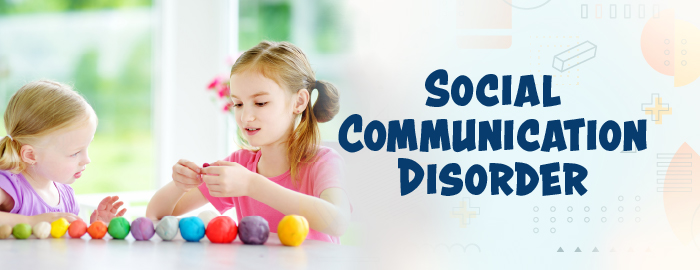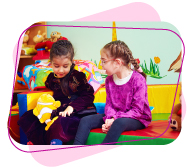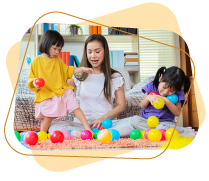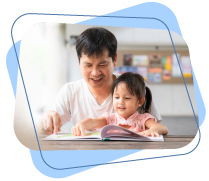|
If you are unable to view our Newsletter Issue 95, May 2022, view in browser.
|
| |
 |
| Issue 95 | May 2022 |

|
A child with a social communication disorder may struggle to communicate appropriately, both verbally and non-verbally, in social situations. He/She may have difficulties with social interaction and social understanding (Paul & Murray, 2015). Here are some signs of social communication disorder:
- Has difficulty engaging in conversations with others (E.g. Asking relevant questions or sharing related ideas)
- Has difficulty following unspoken social rules (E.g. Staying on topic)
- Has difficulty observing and/or interpreting non-verbal cues (E.g. facial expression, body language, tone), spoken language and social context simultaneously
- Doesn’t use appropriate verbal and nonverbal communication with others (E.g. Maintaining eye contact with others)
- Doesn’t understand another person’s point of view
- Talks only about things that he/she is interested in. Doesn’t talk about things that are of interest to someone else (American Speech-Language-Hearing Association, n.d.; Winner, 2007)
It’s unknown what causes Social Communication Disorder. But it frequently occurs with other conditions such as language disorders, attention deficit hyperactivity disorder, and written language disorders (Paul & Murray, 2015). Social communication difficulties are a defining feature of autism spectrum disorder (ASD), in addition to restricted, repetitive behaviours. 
A social communication disorder can lead to numerous problems, including difficulties participating in social settings, establishing and maintaining relationships with peers, succeeding in academic settings, and achieving career success (American Speech-Language-Hearing Association, n.d). A Speech Therapist can help children with social communication difficulties. You can approach a Speech Therapist if you have concerns about your child’s social communication skills.

Below are a few tips to build your child’s social communication skills:

- Model appropriate conversation and social skills in daily routines and situations:
- Use naturally occurring teaching moments that happen during daily routines and interactions to demonstrate good social communication skills.
- Teach your child social skills and talk about the social world by pointing out why you said or did things a certain way in the social context.
- Help your child pay attention to nonverbal messages by exaggerating your actions, gestures, and wait. This will help your child understand that communication is more than words and there’s a lot of information in your non-verbals (Sussman, 2006).
- Discuss how your child or other person feels during everyday activities and situations, and why they feel that way (Paul & Murray, 2015). Talk about the differences in what people like and think (Sussman, 2006).

- Use books to help your child tune in to the minds of the characters in the story. Talk about the character’s facial expressions, feelings, thoughts, and what they were doing. Talk about the different perspectives and ways to solve the problem in the situation. Relate the story to your child’s daily life experiences (Paul & Murray, 2015; Sussman, 2006).
- Focus on your child’s appropriate behaviours (Winner, 2007). When you observe your child behaving in a socially appropriate way, praise him or her. By doing this, you will motivate your child and encourage appropriate behaviours.
References
- American Speech-Language-Hearing Association. (n.d.). Social Communication disorder. American Speech-Language-Hearing Association. Retrieved March 28, 2022, from https://www.asha.org/practice-portal/clinical-topics/social-communication-disorder/#collapse_9
- Paul, D., & Murray, D. (2015, April 3). Social Communication Disorder: Information & Treatments. Autism Speaks. Retrieved March 28, 2022, from https://www.autismspeaks.org/expert-opinion/social-communication-disorder
- Sussman, F. (2006). Talkability: People skills for verbal children on the autism spectrum ; a guide for parent. The Hanen Program.
- Sussman, F. (n.d.). A closer look at social communication difficulties of children with autism spectrum disorder. Retrieved March 28, 2022, from http://www.hanen.org/helpful-info/articles/a-closer-look-at-social-communication-difficulties.aspx
- The Social Thinking Methodology. socialthinking.com. (n.d.). Retrieved March 30, 2022, from https://www.socialthinking.com/social-thinking-methodology
- Winner, M. G. (2015, February 10). Social Thinking Articles. socialthinking.com. Retrieved March 28, 2022, from https://www.socialthinking.com/Articles?name=developmental-treatment-approach-students-learning-issues
- Winner, M. G. (2015, September 19). Social Thinking Articles. socialthinking.com. Retrieved March 28, 2022, from https://www.socialthinking.com/Articles?name=9-tips-talking-parents-childs-social-challenges
- Winner, M. G. (2007). Thinking about you, thinking about me: Teaching perspective taking and social thinking to persons with social cognitive learning challenges. Think Social Publishing.
Useful online resources:
|
|
 |

|
Carline Tan
Speech Therapist
Carline is a bilingual Speech-Language Therapist with more than 5 years of experience working with preschool and school-age children. She graduated from the National University of Singapore with a Masters in Speech and Language Pathology.
Click here to get up close and personal with Carline!
|
|
|
 |
| 10% off Featured Therapists of the Month |
|
Get a special discount on Dynamics Therapy Group's featured therapists...
|
|
|
|
|
| Discounted session with Adult Psychologist |
|
Get a commitment free discounted session at only $50 with our expert adult psychologists.
|
|
|
|
|
| Lunchtime Well-Being for Adults |
|
Do you need psychological and counselling services, but you don’t have time or do not feel comfortable coming to our centre?
|
|
|
|
|
| Employee Assistance Program |
|
Our Employee Assistance Program (EAP) aims to provide your team with emotional support and practical techniques on personal, family, pandemic and/or work-related concerns that might be impacting their performance and general psychological well-being.
|
|
|
|
|
|
 |
|
Connect with us—and keep up to date with our expert tips, exclusive promotions, and latest news.
|
|
|
 |
|
|
|
|
We are a vibrant multidisciplinary team of Speech and Language Therapists, Occupational Therapists,
Physiotherapists, Psychologists, Nutritionist, Educational Therapists and Teachers.
At Dynamics Therapy Group, you can be assured that you only get the best, from the best!
|
| © Dynamics Therapy Centre for Kids Pte Ltd. All rights reserved. |
|
|



